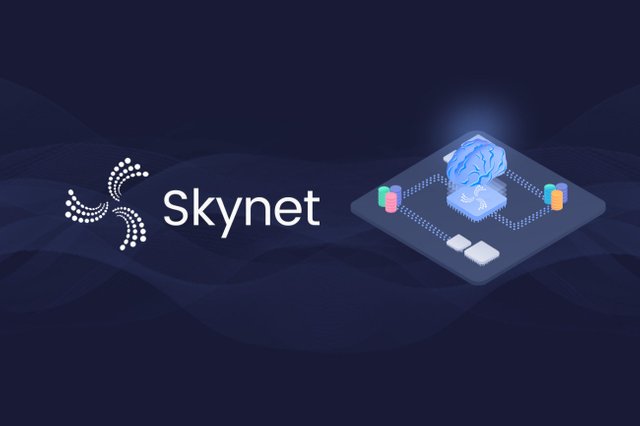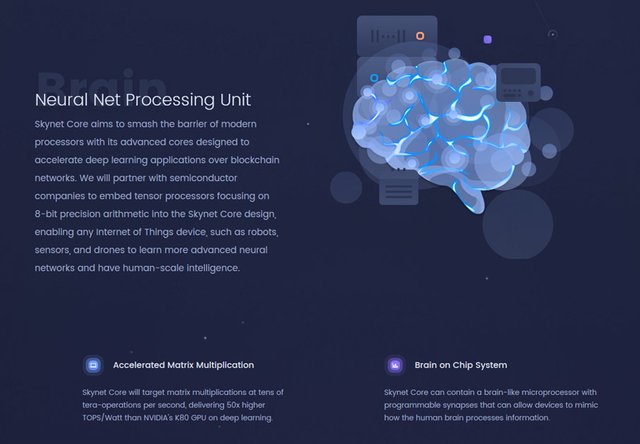Skynet Project Review - Skynet will rise to serve all IoT Techs

The IoT terminology dates back to 1999. Kevin Ashton, the co-founder of MIT's Auto-ID Center, is credited by most sources with coining the phrase Internet of Things. Today, things and people are more connected than ever before. Through Internet-connected sensors, your fridge can automatically order your groceries, your house can automatically adjust to your required heating levels, and your car can recognize back to back traffic on your usual route to work. But the Internet of Things isn’t all about smart cities and talking toasters – in fact, sometimes the simplest applications can be the most significant.
There are tons of areas which we can use IoT devices in our daily life with or without knowing it. Monitoring soil, claiming insurance, waste management, tracking deliveries, improving sales or making energy more efficient are only a few examples to them. Furthermore, people started using IoT devices to make the world a better place.
For example, every year more pocket-sized environmental sensors are being developed to check for radiation, water quality, airborne quality, humidity etc. Understanding the quality of the environment we live in can give us early predictions when environmental problems arise. It can also give us insights in saving resources when it comes to agriculture. E.g. the Netherlands is famous for its tulips, many of the growers can monitor and fine-tune the growing process based on sensor data on sunlight, temperature, soil consistency. They are able to reduce water consumption and grow better products. Another impact is within the greenhouse emissions. Smart meters can help companies predict how large their transport load is going to be, whether some shippings should be combined with each other and which routes of transportation on which time of the day are most convenient. This way they are able to lower the CO2 emissions and costs of fuel.
Another example is, think of being able to predict when maintenance needs to happen, optimize fleet operations, keep traffic going. Microsoft is currently working a lot on providing IoT solutions to give companies insight in their data while using sensors that can lead to costs reductions. Other implementations are e.g. smart street lamps from EnBW, they not only illuminate they also function as charging stations, detect pollution, noise, temperature and so on. Another implementation is smart roads, making it possible to electronically charge buses in the city of Gumi.
The key point here is, we do not have enough IoT technology yet. Most of the startups can't focus on IoT devices due to high expenses and security problems. Also, dealing with big companies like Google, Facebook or Microsoft is harder than anyone can think. Since they already have the market, they are the leaders and captains of the ship. So you can say that there is some kind of monopoly bazaar in this market. Which leads us to have our answer automatically. Evolution of this industry is still very slow.
Blockchain is solving this problem by letting companies integrate themselves to some blockchains. Enabling secure systems over distributed ledger technologies, being able to use smart contracts and being auditable is giving an opportunity for startups to collect and use statistics and data to develop their technologies and solve problems of daily used IoT devices. That way, more companies will be eligible to work on smart devices so that IoT technology can move forward with faster and solid steps.
The question here is, can current blockchains eligible to be worked on IoT technologies?
The answer is, NO.
At its current state, while Bitcoin blockchain can manage 7 transactions per second, Ethereum can handle 25 transactions per second. These speeds are far too slow to be useful for IoT networks with hundreds or even thousands of connected devices all functioning and transacting simultaneously. The tip here is, the faster it gets the more useful it becomes.

Na-ah. Not yet.

Skynet Will Rise!
Skynet is here to solve the problem.
What is Skynet
Skynet's aim is to provide an end-to-end system that includes a hyper-scalable IoT blockchain network and the first blockchain chip in the world. So they are planning to create a platform which can serve all companies of any size. To do that, their most important weapon is being hyper-scalable.
Skynet will use an infinity-blockchain architecture that enables instantaneous transaction speeds and unlimited throughput to provide a scalable network that supports tons of workloads from billions of different IoT devices.
Skynet also contains a virtual application layer which devices can query to access decentralized applications that support the intelligent machine economy such as decentralized identities, distributed storage, digital currencies, node discovery, distributed computation, and decentralized machine learning.
Skynet Core
Skynet Core is license free Blockchain Chip and a key part of Skynet. This Risc-V blockchain chip has the ability to replace an existing CPU and features a core optimized for blockchain technology as well as the Internet of Things (IoT). Also, this is a chip that implements a system-on-a-chip (SoC) optimized for AI and blockchain application.
This chip has three offerings which are called SC-1000, SC-2000 and SC-3000. On is hardware cryptocurrency wallet that provides a high level of security for key management, hash acceleration which boosts cryptographic hash functions.
With a little bit explanation, SC-1000 which is a 32-bit RISC-V Blockchain Core featuring hardware wallet blocks and CPU for use on standard IoT devices. SC-2000 is the 64-bit version that includes tensor processing, hash acceleration, and the hardware wallet, all for Edge Intelligence.

Skynet Features
Embedded Crypto Wallets
One of the key features of Skynet is the embedded crypto wallet in Skynet Core. This crypto wallet has RSA encryption and secure memory. The goal of this crypto wallet is letting devices like wearables and smartphones have crypto storage capabilities just like those found on the ledger.
High-Performance Blockchains
With the help of Skynet Core, only four devices can run private or public high-throughput blockchains that can handle more than 10.000 transactions per second. Each of these devices can run consensus algorithms considered to be computationally expensive, such as Proof of Work.
Blockchain Hardware
The hardware makes it possible for Skynet Core devices to run blockchain networks with high throughput while providing secure protection from theft of cryptocurrency. Skynet Core gives billions of devices instant access to the quickest of all IoT blockchain networks.
Hash Acceleration
With SHA-256 crypto engines which are specifically designed to run high-speed distributed applicants or blockchains, the core should deliver a decryption and encryption rate that is quicker than 20 MBS half duplex.
Automated Transaction Signing
Skynet has AI processors that allow automated transaction signing.
Skynet Neural Net Processing Unit
Skynet Core has connected NPU (Neural Processing Unit) for acceleration of training of AI and speed of performance of model. The core delivers advanced core designs that can accelerate deep learning applications on blockchain networks. They are planning to form partnerships with various semiconductor companies as a way to embed tensor processors into the design of Skynet Core. These embedded tensor processors will allow any IoT device to learn advanced neural networks to allow for human-scale intelligence.

They also have some features which are going to work as a brain on-chip system. This system's purpose is being a brain-like microprocessor with programmable synapses that allow devices to copy how human brains process information.
Overall, the Skynet Cores are highly customizable, with the option of adding them to any Neural Processor, Graphics Processor or Tensor Processor.
What is Skynet Open Network (SON)
To facilitate this global blockchain powered network of connected devices, Skynet also provided a highly scalable system called the Skynet Open Network (SON).
SON is an IoT optimized network which is infinitely scalable. Furthermore, it will also allow for transactions between various intelligent devices. With a little bit of estimation, billions of Skynet Cores deployed to devices worldwide will all include the native cryptocurrencies of SON. And this will allow the Skynet Open Network to become most adopted of all blockchain networks instantly.
The system provides benefits like instant finality, infinite sharding, cross-chain communication, Proof of Stake (PoS), and a decentralized exchange(DEX).
Also, the transaction fees on Skynet are extremely low (<0.01$)
So we can name Skynet as a whole new platform, which contains lots of solutions in it.
Skynet is here to serve!

Skynet Team
Skynet Team is promising. They have really strong backgrounds which you can check from their Linkedin profiles.
Alexander Shi – CEO and Founder
Founder of OpenSingularity
AI Research Featured on Cell and Nature
UCSD Medical Deep Learning Researcher
Keynote Speaker at Chinese Summits
Intel and Amazon Robotics
Dr. Jae Jung – CTO and Co-Founder
Vice President of Samsung
Founder of NeoPace
UCSD Researcher
Samsung Technology Award Winner
Samsung Research Fellow
Tami Zhu – COO and Co-Founder
Head of Alibaba Group US BD
Head of AOL Ventures
100 Most Influential Women Silicon Valley
Raised 150m for Rokid AI Startup
Vice President IAC/InterActiveCorp
Head of Excite International Joint Ventures
Dr. Carl Shi – Director and Co-Founder
Vice President of Qualcomm
Lead Commercialization of Chips
Inventor over 400 Patents Worldwide
Voice-Controlled Translation Device Inventor
Leader for Qualcomm Project Startups
Louie Lu – Director of Product
Qualcomm IoT and AI Staff Product Manager
Qualcomm Strategic Ecosystem Development
Led Commercialization of Qualcomm SoCs
Former General Manager at 12 Sigma, China
Rachel Ye – Business Development
Google Ventures, Investment Arm of Alphabet
RA at GV, Seed Investors of Uber, Stripe, Slack
Consultant for Facebook Inc.
Oath Consultant at CMG Strategy
First Place Deloitte Startup Competition
ICO Metrics
- ICO Time: TBA
- Ticker: SON
- Token Type: ERC20
- Softcap: 3,000,000 USD
- Hardcap: 38,000,000 USD
- Total Supply: 150,000,000,000
- Available for Token Sale: 20%
- ICO Token Price: 1 SON = 0.00035 USD
Each SON token will be swapped to one of each of the three tokens in the Skynet ecosystem: Skynet, Light, Singularity.
Token Distribution
Here are the token distribution details about Skynet Project.
![]()
Roadmap
December 2018
Phase 1: Genysis
Skynet Open Network Testnet
August 2019
Phase 2: Evolution
Skynet Open Network Mainnet
December 2019
Phase 3: Salvation
Skynet Core FPGA
December 2020
Phase 4: Singularity
Skynet Core SoC
August 29, 2022
Phase 5: Judgement Day
Billions of connected devices
Use Of Funds
Looks like most of the funds will be used to develop the platform. While %3 of the funds will be using dApps, other %3 of the funds will be used to support Skynet Blockchains.
![]()
Useful Links
Skynet Website: https://skynet.co/
Skynet Whitepaper: https://skynet.co/img/lightpaper.pdf
Skynet Telegram: https://t.me/SkynetOpenNetwork
Skynet Twitter: https://twitter.com/OpenSingularity
Skynet BitcointalkANN: https://bitcointalk.org/index.php?topic=4641725
Skynet Medium: https://medium.com/skynetproject
Skynet Facebook: https://www.facebook.com/OpenSingularity/
Ethereum Wallet Address: 0x0Af863DC05fd242d46829a1835555ff4e99902eE
very informative article...thank you
Great review.